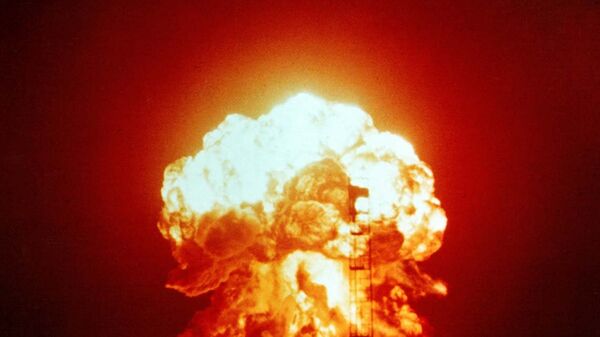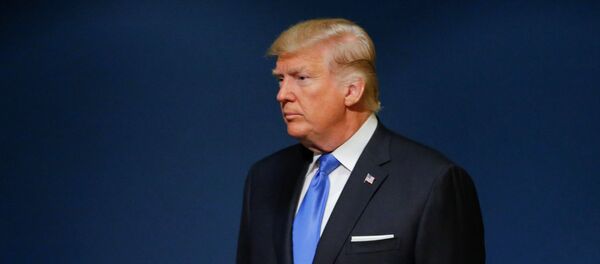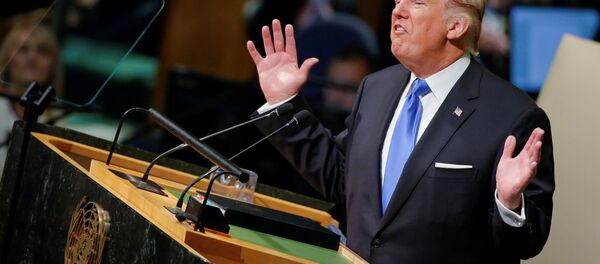US President Donald Trump's threat to "totally destroy" North Korea in case the US is "forced to defend itself or its allies" means a potential atomic Armageddon for the Korean Peninsula, Konstantin Sivkov, a Russian military analyst and president of the Academy for Geopolitical Problems, told Sputnik China.
"We must keep in mind what a strike on the Democratic People's Republic of Korea (DPRK) may result in," Sivkov said. "If the US decides to begin an all-out war against North Korea it will mean only one thing: 25 nuclear reactors in South Korea will be destroyed by a retaliatory attack from the DPRK. This equates to 25 Chernobyl disasters on the Korean Peninsula."
It's easy to guess what the consequences would be, the expert noted: the Korean Peninsula, considerable parts of China and Russia, let alone most of the territory of Japan will turn into a "dead zone."
"In comparison with this, the Fukushima nuclear catastrophe would look like a firecracker," Sivkov pointed out. "In fact, Trump is pushing [the peninsula] toward a nuclear collision, and it must be realized that if a nuclear strike is launched against North Korea, it is unlikely that China and Russia will stand idly by."
However, Trump didn't specify who exactly poses a threat to the sovereignty of Ukraine and waters of the South China Sea, leaving the question open. In the eyes of Beijing the threat to its sovereign rights in the maritime region comes from the US. Therefore Trump's comment could be interpreted as a call to protect China's sovereignty from the US itself, the expert remarked.
According to Sivkov, while delivering his speech at the United Nations General Assembly on Tuesday, Trump contradicted himself.
The expert drew attention to the fact that Washington doesn't have a clear position on its foreign policy: On the one hand, Trump proclaims the inviolability of sovereignty, while on the other hand he declares his determination to interfere in the internal affairs of other nations.
The expert stressed that the fight against "hybrid wars" also remains high on the agenda of the SCO and with good reason: "A hybrid war is the US' main way of conducting operations against other countries."
The Astana declaration of the Heads of State of the SCO signed on June 9, 2017, calls upon its members to team up in order "to counter common security challenges and threats, deepen dialogue and cooperation to ensure comprehensive security, primarily in fighting terrorism, including cyber-terrorism, separatism, extremism, cross-border organized crime, illicit drug trafficking."
According to Sivkov, the adoption of the declaration indicates that SCO member-states have united against potential aggression from the West and the US in particular.
On the one hand, the US president called on the international community to respect the principle of state sovereignty, and on the other he threatened some countries with decisive actions, including total destruction, the Chinese academic noted referring to Trump's threat to destroy North Korea.
According to Zhou, "Trump's speech… demonstrates a lack of political culture."
On Tuesday US President Trump delivered his first ever speech at the United Nations General Assembly issuing threats to a number of countries, including North Korea, Iran, Venezuela and Cuba and called upon UN member states to "confront together those who threat us with chaos, turmoil and terror."
The delegation from North Korea left the conference room before Trump addressed the meeting and didn't hear him calling the DPRK leader a "Rocket Man." However, afterwards DPRK Foreign Minister Ri Yong-ho compared the US president's speech to "dog barking."
For his part, Venezuelan Foreign Minister Jorge Alberto Arreaza stated that Trump is by no means the president of the world, adding that each country has its sovereign right to maintain the system it chooses.
"This is return to the cold world, for a moment, we didn't know if we were listening to President Reagan in 1982 or to President Trump in 2017," Arreaza noted.
China stood up for Caracas: Chinese Foreign Minister Wang Yi signaled to his Venezuelan counterpart that Beijing believes that the Venezuelan government and people will manage to resolve their problems within a legal framework, Reuters reported.
Commenting on Trump's first speech at the UN General Assembly, Iranian President Hassan Rouhani called it "ignorant, absurd and hateful rhetoric."
"By violating its international commitments, the new US administration only destroys its own credibility and undermines international confidence in negotiating with it or accepting its word or promise," Rouhani emphasized addressing the UN General Assembly.





